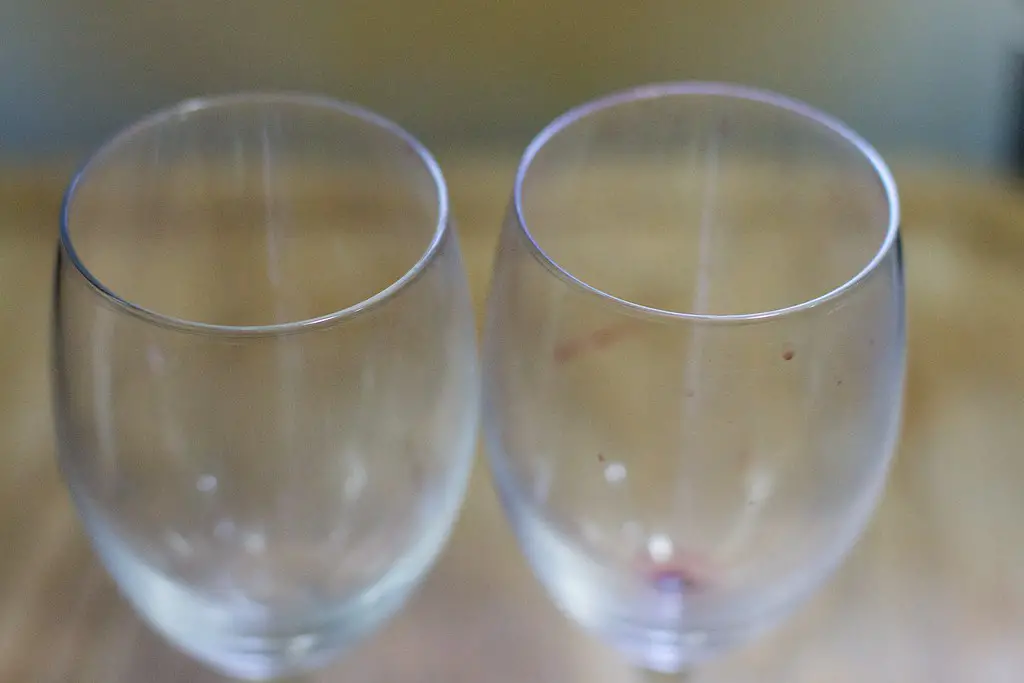One thing that frustrates many people is spotting cloudy dinner glasses. It is frustrating to hold a glass that should be clean only to see a foggy or cloudy film covering its surface.
In most cases, individuals with cloudy glasses hold on them for a while then throw or hide them at the back of their cupboard for use when no one seeing. However, this doesn’t have to be the case as this is entirely preventable.
Today, we’ll look at why your dishwasher machine makes your glasses cloudy and different ways you can prevent this.
Causes of Cloudy Glasses and Possible Solutions
1. Hard Water Deposits
Hard water or water with high mineral content is a common cause of cloudy glasses. It causes this in two ways.
One is that the minerals in it could reduce how effective your detergents are such that you may need to use more detergents when washing your dishes. Also, compared to soft water, hard water doesn’t rinse well.
As a result, it leaves a film of soap or dirty water on your glasses. That means that if you add too much detergent in hard water, it makes the rinsing problem worse. Additionally, when the minerals in hard water dry onto the surface of your glass, they cause a cloudy film.

To fix this, one must first determine if they’re using hard water. Soak a cloudy glass in vinegar for some minutes then check to see if cloudy deposits are removed. If they’re, hard water is likely to be the issue.
There are different ways individuals can fix this hard water issue, including:
Use a Rinse Aid
Rinse aids are available in solid and liquid form. By breaking the bond between the dishes and water, they can help reduce fogginess. Plus, most of them are added with dishwashing load.
Use White Vinegar
White distilled vinegar helps remove limescale deposits caused by hard water by loosening the minerals that are clouding your glassware. Using a rug with some tablespoons of vinegar on it, rub the minerals off your glass with your hand. Or one can also soak their glasses in a mixture of hot water and vinegar.
Leave them for a while then shake off excess water and allow your glasses to dry. As vinegar evaporates completely, it’ll leave no smell or residue, only sparkling clean dishes.
Individuals can also add vinegar directly to their dishwater in the rinse compartment. This is an excellent alternative to a rinse aid. This is highly effective when combined with high temperatures as it’ll help in preventing the foggy film from developing when glasses are being washed.
It can also get rid of stinky odor in a dishwasher. But, if you’re using hard water, you may not get strong results, so it’s best that you hand clean your glasses with vinegar.

2. Etching Problems
If the cloudy film isn’t removed by vinegar, then hard water isn’t your issue. You may be having an etching problem.
Etching is simply several scratches on your glassware that are caused by a number of things such as soft water, too much dish soap or a dish soap containing phosphates, dishes that are over rinsed before placing on the dishwasher or using water that’s too hot.
Individuals should try different combinations of dishwashing methods to determine which of these reasons could be the cause of etching. Here are several ways of controlling etching:
Avoid Heavy Rinsing or Pre-washing
Alkaline salts contained in most dishwashing detergents are neutralized by food and oil particles on your dishes.
This means that if one removes all food particles from their dishes before placing them into the dishwasher, the detergent will have nothing to neutralize. As a result, the effect will be on the dishes themselves.
Use Moderate Detergent
The cloudy glasses you’re having could be as a result of using too much or too little detergent. If you have soft water, you only need less soap while those who are using hard water need more detergent.
Although you can experiment with different amounts of soap until you figure out what amount is enough to clean your dishes, you can also have a professional test your water to determine the right amount of detergent you need.
Additionally, individuals should also try using a different detergent. Note that some detergents, especially, gel ones, cause more etching depending on factors like the softness of your water among others.
Try using a milder detergent with a lower pH or one that doesn’t have phosphates.
Here is a Fox News report that presents the changes in dishwasher detergent formula:
3. Clogged Drain
As your dishwasher removes dirt from flatware, water is drained through a screen. With time this ‘dirt’ can build up forcing the dishwater to recycle dirty water. If you use this water for cleaning, it might cloud your glassware.
Individuals should, therefore, regularly check the drain area to ensure that there’s no dirt build-up. If there is, clean it up immediately to ensure that you’re using clean and freshwater to wash your dishes.
4. Wrong Water Temperature
Temperatures inside your dishwater need to be not less than 130 degrees Fahrenheit. Too cold water doesn’t allow the detergent to be dissolved correctly hence will leave a cloudy film on your glasses.
Wash your glasses using your hands and check if the cloudiness is washed away, if it is, then this could be the problem. Hold a thermometer under the faucet and determine how hot the water gets. Or individuals can also ensure that there’s hot water before they start their machine.
Additional Tips to Prevent Corrosion
- Buy only dishwasher safe glasses
- Use correct settings for any water softening units
- Select a dishwashing cycle if your dishwasher can allow
- Once the cycle is complete, open the door to allow steam to escape
- Don’t remove your glasses until they cool
Final Thoughts
Sure bringing your family and friends together for a diner or any other party is satisfying. But, it entails some work before and after the festivities. Apart from meals, you’ll have to search your cupboards to provide exquisite flatware.
Well, although dishwashing machines are a modern convenience that many people can’t live without, opening the door only to find cloudy glasses can be a bit discouraging.
Fortunately, these tried tips can help you deal with cloudy glasses. However, we recommend that you hand wash and air dry delicate glassware like vases or wine glasses. Also, only use mild soap and less pressure on them.
